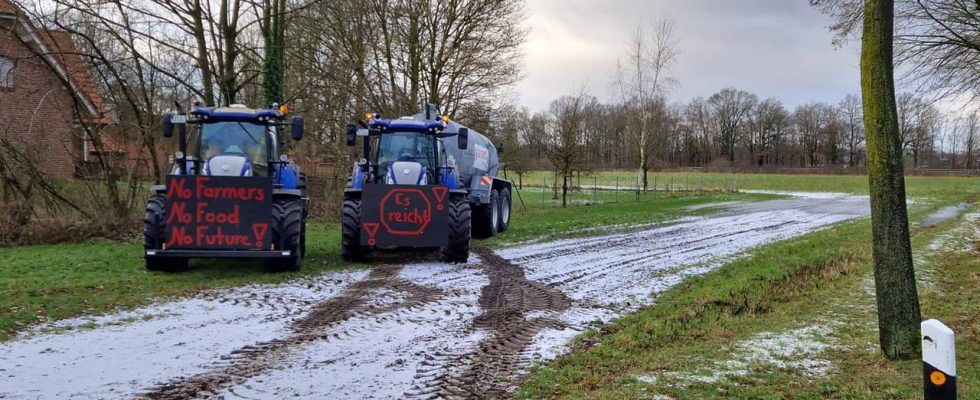The major rally in Berlin was the highlight of a week full of protests. Farmers have clearly expressed their displeasure. The results are different for the farmers.
Albert Rohlmann sits contentedly on the bus that takes him from Berlin back to Münsterland. He was there with several colleagues to take part in the large rally in front of the Brandenburg Gate. Behind him and thousands of farmers lies an eventful week full of protests and demonstrations.
Rohlmann is a pig farmer in Hörstel and chairman of the Steinfurt Agricultural District Association in North Rhine-Westphalia. At a rally organized by the association last Monday, 2,500 farmers came to Saerbeck with their tractors and 1,500 with their tractors from all places. There were events at weekly markets and various in-person trips throughout the week.
Farmer Albert Rohlmann’s assessment of the week of protests is positive.
“Shoulder solidarity with the population”
“Everything has gone great so far, there has been a great solidarity with the population,” is Rohlmann’s initial assessment. He has found consistently positive support and many people have spoken to him. “They all say: It is no longer possible for politicians to make decisions without assessing the consequences,” says Rohlmann.
They simply don’t look at how all of this is affordable. “It’s getting tighter for everyone – and for us farmers it’s no longer feasible. What they’ve done to us in the last few years has been outrageous.” Rohlmann assumes that the farmers’ message has been received: “We expect that something will now clearly change.”
Massive increase in bureaucracy
Andreas Puckert, a farmer in Saerbeck, was also at the rally on Monday. He didn’t make it to Berlin. But out of solidarity, he put a tractor on the road in front of his farm. A yellow beacon flashes and banners with slogans such as “Too much is too much” or “If the farmer dies, the country dies” hang on the vehicle.
He is less optimistic about change. An end to the agricultural diesel subsidy would cost him almost 6,000 euros a year. However, that is not the point that concerns him most. Above all, he complains about the massive increase in bureaucracy, which now takes up far too much time. “We have to register, re-register, maintain databases. It’s becoming more and more,” he complains.
Farmer Andreas Puckert is particularly bothered by the increasing bureaucracy.
But Puckert fears that little will change. “They are now all promising to reduce bureaucracy. But what we need is a fundamental reform,” he is convinced.
It’s not just about the farmers. “This needs a fundamental push from all sectors. My wife is a nurse at the university clinic in Münster, they write more papers than they can take care of patients,” says Puckert. But fundamental changes are still a long way away.
More Creative scope for agriculture
After the week of protests, he draws a sober assessment. “I don’t have the impression that politics will make much of a difference. They will accommodate us a little. But I don’t expect much from further discussions,” said Puckert.
In any case, the farmers have done everything, says district chairman Rohlmann. What happens to agricultural diesel is now the responsibility of politicians. “Today, Christian Lindner positioned himself against us and only threw small bites,” said Rohlmann. Maybe he needs to let the event sink in first. There is still room for maneuver.
No place for right-wing extremists
Overall, he hopes that agriculture will be given more scope for action again. “Entrepreneurial decision-making ability must once again rest more with the farmer, not with politicians in Berlin,” said Rohlmann.
The district chairman is happy that right-wing extremist groups have hardly succeeded in infiltrating the farmers’ protests. “We farmers are so close together that there is no room for rights,” said Rohlmann. “We want to make our concerns known as a unit in the form of approved demos. We are a unit and look out for each other.”

